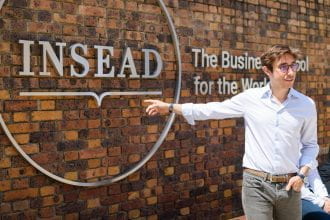
When next-generation broadband satellite operator Kacific launches its first satellite later this year, INSEAD’s “Force for Good” logo will be emblazoned on the SpaceX Falcon 9 rocket as it shoots into space. The Singapore-based company provides universal access and connectivity throughout isolated regions in the Asia Pacific at an affordable cost.
Founder and CEO Christian Patouraux MBA’03D wants to include INSEAD’s logo on the rocket as a testament to his belief in business as a force for good—and the work that Kacific is doing.
“We are helping to save lives at rural medical clinics and educate kids.We are providing emergency connectivity to police stations and disaster response and relief teams,” Patouraux says.“I think the world needs what I’m doing at Kacific. INSEAD emboldened me and gave me the confidence, the tools, the knowledge and the network to do it.”
I think the world needs what I’m doing at Kacific. INSEAD emboldened me and gave me the confidence, the tools, the knowledge and the network to do it.
Carving a path
In many ways, Patouraux was destined for the role he has today. Since the time his uncle gave him a calendar featuring steam trains as a child, he was fascinated with how technology could solve human problems.
That curiosity led him to study engineering at the University of Brussels Polytechnic School and the Von Karman Institute. He discovered an interest in aerospace while completing his military service in Belgium as a research scientist.
In 1995, he became a spacecraft engineer with satellite company SES, where he learned about astrodynamics, rocket propulsion and the automation, control and procurement of satellites. “I could see endless possibilities,” Patouraux remembers. “What I found mind-boggling was that one satellite could easily reach 50 or 100 million people.”
As he watched SES grow, Patouraux began to consider how to apply the knowledge he had gained from helping launch seven satellites. He decided to pursue an MBA. “It was like a calling,” he says.
Patouraux’s dual French and Belgian identity drew him to INSEAD’s international community, which he found transformative. “INSEAD opened my mind to the possibilities of marrying my satellite experience with my understanding of business,” he shares. “But beyond that, it really made me question who I was. I didn’t know if I should go back to the satellite world, or if I should I start something completely different.”
A life-changing experience
Near the end of 2004, Patouraux was ready to celebrate. The entrepreneur had launched Oghma, a start-up that provided free WiFi hotspots across Singapore, and he wanted to spend a relaxing Christmas in Thailand. He booked a ticket, not knowing that the trip would change the course of his life.
On 26 December, Patouraux was caught in the tsunami that ripped through Thailand. Thankfully, “I was at the right place at the right time when the wave arrived,” he says. “It went left and right around my hotel and didn’t hit me at all. But I saw people dying around me. It deeply affected me—the things I saw and the guilt, especially the guilt of not having lost anything or anyone.”
In the aftermath of the tragedy, Patouraux tended to the injured and later founded a charitable venture in Thailand that distributed disaster aid and built longtail boats for fishing in an area where many people had lost the boats they depended on for their livelihood. For months, Patouraux lived and worked with locals, which helped with his own recovery. The experience also exposed him to a critical, unmet need in the developing world: access to the internet.
Connecting the world
While running his charity operations, Patouraux found it difficult to connect to the internet in remote areas of Thailand, so he set up a satellite dish—a move that quickly caught the attention of locals.
“The neighbours started coming and saying, Can I use your Internet? I can even pay you for it,” he remembers. “I soon had villagers from a nearby village coming into the operation, using and paying for the Internet.”
After about nine months, Patouraux returned to Singapore to run Oghma and do consulting work. But the problem of internet connectivity in Thailand continued to circle in his mind, even as he transitioned into larger roles at Morrigan Investments, O3B Networks and Measat Satellite Systems. His business travels also took him to remote places where many hospitals, schools and civil defense outposts didn’t have an internet connection.
Sometimes, this lack of access could be “a matter of life or death,” he says.“I hit another crossroads where I felt I had to do something meaningful, just like I felt before going to INSEAD or after the tsunami.”
A new calling
Patouraux did do something about it: In 2013, he founded Kacific Broadband Satellites Group to bring low-cost connectivity to remote regions of the Asia Pacific. The company began providing an interim service in 2017 by leasing Ku-band coverage from existing satellites as it built its own. It raised more than US$165 million to order a satellite designed and constructed by Boeing and purchase a SpaceX Falcon 9 rocket.
This year, the company will launch the satellite called Kacific1, a Ka-band high throughput satellite, which already has more than US$600 million in contracts from future customers for its 56-beam capacity. Plans are also in the works potentially for a second satellite.
Within months of deploying Kacific’s service to connect rural healthcare centres to urban hospitals, Patouraux began to hear about lives being saved thanks to emergency communications provided by the system. He says it is gratifying to see his vision being applied to help so many.
“I had this calling to create a company that is meaningful for the world,” he says. “What we’re doing is a public service providing fundamental high-speed connectivity with a sustainable business plan. This is opening so many possibilities to change people’s lives, and that’s very rewarding.”


